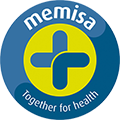Corona: strict quarantine is impossible in DR Congo
“The situation in the DR Congo is getting worse day by day. We are seeing a systematic increase in the number of corona cases. At this moment, I don’t have the feeling that people are panicking. But that could change quickly. The government took some strict measure, which is good. But we may not forget that 95% of the population lives from day to day to make a living. Strict quarantine is therefore impossible for most Congolese. For them it’s a choice between starving at home or being infected by the virus along the way”, says Dr Joseph Mukombozi.
The rapid evolution of Covid-19 in Africa is worrying. We can’t afford to lose time. We need to take action to contain the virus. And however Memisa is concerned about the consequences of this crises, at the same time we try to stay hopeful: we can still change the course of this pandemic. Like in Europe, in Africa as well we should try to flatten the curve. In other words doing as much efforts as possible to reduce and slowing down the peak of infected patients to avoid overburdening the healthcare system.
Therefore, as a medical NGO, we need to respond quickly and deploy additional resources and capacity for:
- Awareness-raising activities. Campaigns to make the population aware of the seriousness of the situation, without causing unnecessary panic. We are communicating the importance of hygienic measures and social distancing.
- Protection and prevention. There is a big need for specific equipment for the medical staff to prevent themselves (masks, gloves, …), but also a lack of soap, water taps, disinfecting gel, …
- Reinforcement of the primary health care. The health system in the DR Congo is extremely fragile. We should ensure that the system doesn’t collapse completely as a result of this crisis. We are enabling a health system that is more accessible, more effective and more resilient.
- Training staff, so they know how to deal with patients showing symptoms of coronavirus.
- Medical equipment is necessary, both in the health centres as in the hospitals.
Medical and humanitarian disaster
In early March, the Ebola outbreak ended after 19 months. But what should have been a joyous fact became overshadowed by yet another health crisis. We don’t know how this new crises will develop. But it’s certain, that if no necessary measures are taken, this will result in a medical and humanitarian disaster. Not only the mortality rate is expected to rise sharply. In addition, the unaffected population will be touched by sides effects. For example: overburdened health facilities won’t be able anymore to threat patients with other diseases.
Memisa is doing everything in its power to continue its programmes to support the most vulnerable communities. Together with our partner Medics without vacation, we operate on strengthening health systems to improve health outcomes.
We will have to tackle this crisis together. Because the only treatment we have so far is solidarity. Stay home, show solidarity and make a donation!

